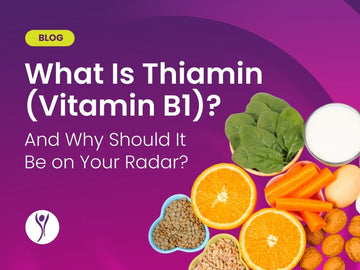by Brenda Hoehn on Sep 14, 2023


Synthetic vs. Natural Supplements
The discord over the “synthetic vs. natural supplements” debate is decades in the making. Much of that debate consists of proving that natural (organic) supplements are definitively superior to synthetic (isolated) supplements.
We get it. When you hear the word “synthetic” in a health and wellness product, your instinct is to keep your distance. But it might surprise you how common synthetic supplements are.
They often get a bad rap because they are “artificial,” not natural. Would you believe us if we told you “artificial isn’t always bad!”?
Let us shed some light on synthetic supplements. Keep reading to learn more!
What Are Synthetic Supplements?
Professionals develop synthetic supplements (isolated supplements) in a laboratory setting, allowing for excellent quality control and the ability to create dietary supplements that mimic natural nutrients’ actions and interactions in our bodies.
Synthetic supplements encompass:
- Amino Acids,
- Antioxidants,
- Minerals, and
- Vitamins.
And depending on the micronutrient, you may find multiple forms, including:
- Capsules,
- Liquids,
- Pills,
- Powders, and
- Tablets.
What Are Natural Supplements?
Natural supplements (whole-food supplements) come from… you guessed it: whole foods. Manufacturers produce these supplements using concentrated, dehydrated whole foods, such as:
- Fruits,
- Nuts,
- Vegetables, and
- Whole Grains.
Natural supplements contain the same compounds as the food they derive from, meaning some automatically have additional nutritional components like antioxidants.
Synthetic vs. Natural Supplements Research
Most professionals in the dietary supplement industry approve of the respected scientific studies that offer reliable statistical data on natural nutrients' benefits over synthetic nutrients.
Many of these studies are very nearly unbiased. Scientists conducted them to record legitimate data representing the differences in our bodies’ responses to natural and synthetic nutrients.
What you’ll find in the results is nothing new: getting nutrients from your fruits and vegetables is better than replacing a diverse diet with supplements. We know this, and we agree! A diverse diet is your first line of defense against nutritional deficiencies.
But sometimes, we need extra support to meet our nutritional needs, especially those of us who regularly consume fewer calories and live with malabsorption in the bariatric community and beyond.
Some natural supplement brands and sellers cite scientific research to support the benefits of organic nutrients while stigmatizing synthetic supplements as inferior for being “artificial” without addressing their significant impact on nutrient deficiencies resulting from factors other than a poor diet.
4 Benefits of Synthetic Vitamins
For those of us who have had bariatric surgery, our supplement regimen is a permanent part of our post-op lifestyle to prevent the significant health consequences of malabsorption.
Synthetic vitamins and supplements can be highly beneficial to bariatric community members, especially for these four reasons:
1. Bioavailability
When it comes to dietary supplements, their bioavailability is:
- (1) the fraction of their specific nutrient that ultimately makes it to the small intestines and is absorbed into the bloodstream and
- (2) how much of that fraction the body uses or stores for later.
When a nutrient is bioavailable, it means it is in its “active” form that the body can use. Natural nutrients achieve their active forms by experiencing a series of chemical reactions during the digestion process.
On the other hand, synthetic supplement manufacturers use a controlled lab setting to produce a product’s nutrient in its “active” form straight from the packaging.
2. Efficiency
Efficient manufacturing is essential to meet consumer demands in the dietary supplement industry. Synthetic supplement manufacturing fast-tracks production while saving resources and the environment.
According to these 2023 industry statistics, about 77% of Americans take at least one dietary supplement, while the market offers about 29,000 different supplement types.
Natural supplement manufacturing is inefficient because it:
- (1) requires significant amounts of fruits and vegetables and
- (2) additional time and resources to properly extract the vitamins and nutrients from their organic sources.
3. Potency
To combat a reduction in natural nutrient intake and malabsorption, bariatric patients need products that carry high amounts of the nutrient(s) their bodies need to function correctly.
Take vitamin C, for example:
- One average-sized orange contains about 68 mg of vitamin C.
- Vitamin C supplement capsules and tablets often contain 500 mg or 1,000 mg.
To receive 500 mg of vitamin C, you would have to consume about seven oranges!
Note: Consult with your doctor before starting any supplement regimen. Everyone’s dosage is unique and depends on their health history and status.
4. Purity
The laboratory settings that produce synthetic supplements provide significant quality control and the ability to test the purity of:
- Ingredients,
- Manufacturers,
- Raw Material Suppliers and
- Finished Products.
More control over a product’s environment and the ability to test it before sending it off for distribution means you, the consumer, can have better peace of mind knowing that your daily vitamin and supplement routine is good for you and your body.
Enjoy the Benefits of ProCare Health’s Premium Daily Vitamins & Supplements
At ProCare Health, our synthetic and natural products undergo a testing regimen, providing results with a transparency unmatched by other companies in our industry. Our commitment to quality control ensures that ProCare’s customers can rest easily, knowing their daily supplements are reliable and safe.
The ProCare Health product line ranges from a variety of bariatric multivitamins to:
- Calcium,
- Protein supplements, and
- Therapeutics (e.g., iron, omega-3 fish oil, probiotic, etc.).
If you need high-quality bariatric vitamins and supplements, ProCare is excited to help!
Stay connected by visiting our website today for educational resources, a bariatric support community, and to browse our nutritional products. Patients and professionals may also contact us for customer support needs and with any questions by filling out our contact form and by giving us a call:
- Contact Form: https://procarenow.com/pages/contact
- Phone: (877) 822-5808

Is Your Body Asking for More Calcium?



